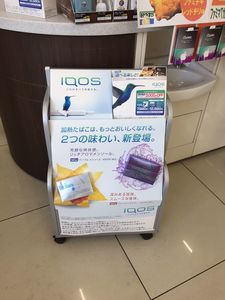I quote from British American Tobacco’s International Marketing Principles, 2015:
We will not portray smoking as an activity that makes people appear more popular, appealing or successful.
But they seem to have no qualms about portraying the use of their new product with the almost unpronounceable name of ‘glo’ as an activity that makes people appear more popular, appealing or successful.
 This is from a twenty-four-page booklet about ‘glo’ in Japan. I picked it up from a promotional display in the street outside a corner shop in Tokyo. A young person seeing this – and how can you prevent children and young people from seeing this and similar advertising? – might well want to try it just to appear popular and appealing like the models in the picture. And while all of them except one are raising their glasses in a toast to something, three of the models are looking directly at the young man holding, not a glass of wine, but his ‘glo’ contraption. Also, note the bowl of fruit in the lower part of the picture – healthy food – being associated with the poison you can suck into your lungs with the ‘glo’ thingummy. The advertising people must have worked really hard on this one!
This is from a twenty-four-page booklet about ‘glo’ in Japan. I picked it up from a promotional display in the street outside a corner shop in Tokyo. A young person seeing this – and how can you prevent children and young people from seeing this and similar advertising? – might well want to try it just to appear popular and appealing like the models in the picture. And while all of them except one are raising their glasses in a toast to something, three of the models are looking directly at the young man holding, not a glass of wine, but his ‘glo’ contraption. Also, note the bowl of fruit in the lower part of the picture – healthy food – being associated with the poison you can suck into your lungs with the ‘glo’ thingummy. The advertising people must have worked really hard on this one!
So I wrote to BAT through their website asking them the following question:
In your International Marketing Principles you say, ‘We will not portray smoking as an activity that makes people appear more popular, appealing or successful.’ But your promotional leaflet and the website for ‘glo’ in Japan does just this very thing. Do you have different ethical standards and marketing principles in different countries?
I received a polite reply from someone in their External Affairs department in Japan:
Although we don’t have specific International Marketing Principles in place for Tobacco Heating Products yet, please be assured we are applying the spirit of our existing principles to ‘glo’ as well as adhering to all regulations and voluntary codes.
I shall leave it to the reader to judge how far the spirit of BAT’s existing principles applies to to their ‘glo’ product.
And how about this display in a Tokyo convenience store, conveniently placed at a child’s eye level: Big Tobacco, fearing that sales of cigarettes are going to decline more and more (at least in most developed countries), are rushing to bring out alternative tobacco products with the claim that these are less harmful. Apart from BAT’s ‘glo’, examples are Philip Morris’s IQOS (or iQOS) and Japan Tobacco International’s ‘Ploom’ – at least you can pronounce the last-mentioned.
Big Tobacco, fearing that sales of cigarettes are going to decline more and more (at least in most developed countries), are rushing to bring out alternative tobacco products with the claim that these are less harmful. Apart from BAT’s ‘glo’, examples are Philip Morris’s IQOS (or iQOS) and Japan Tobacco International’s ‘Ploom’ – at least you can pronounce the last-mentioned.
The fumes generated by these products still contain poisons, although maybe in smaller amounts compared with ordinary cancer sticks. The user is going to suck the fumes thereof into his or her lungs many times a day for years on end. And for what? To achieve a state of bliss? To see visions of heaven?
Are we non-nicotine users missing something?
Text © Gabriel Symonds

Leave A Comment